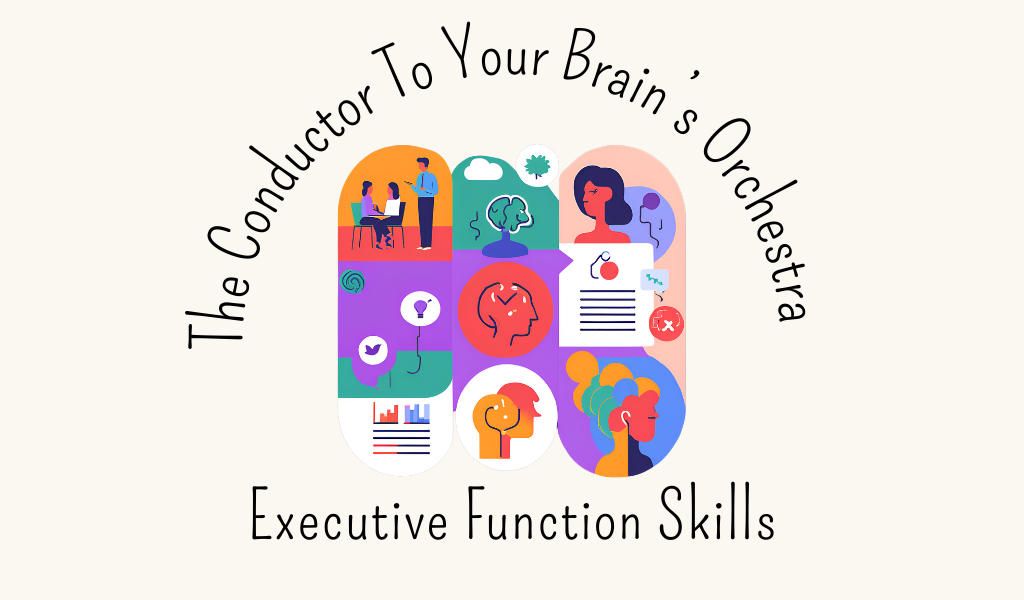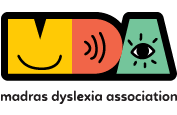
The Conductor To Your Brain’s Orchestra – Executive Function Skills
Understanding SLD
By Krishnakumari
Think about everything you do on a daily basis. You move, think, work, interact with others, experience emotions, and make decisions. So, what are the skills that enable us to plan, focus attention, switch gears, and juggle multiple tasks? It is the executive functioning skills. Executive Functions are our brain’s directive capacities – how we manage information, plan and decide, act or refrain from acting, and adapt to unexpected situations.
A great analogy for “executive function” is the brain’s orchestra, in which the brain’s processes are compared to the instruments in the orchestra, all of which are coordinated by the conductor. The prefrontal cortex is like the conductor of an orchestra, coordinating every instrument and section to create harmonious music. Similarly, the prefrontal cortex keeps everything a body does in sync. It governs many higher-level activities involving mental control and self-regulation. Executive Functions are developed; we are not born with them. We are born with the ability to develop them but it takes some time for these processes to mature.
Executive Function skills include:
- Attention – sustaining focus, especially for lengthy or challenging tasks that may have many components
- Task Initiation – starting a non-preferred task and overcoming a desire to procrastinate
- Organization – keeping track of materials at home and in school, organizing ideas and information for essays and research papers, managing digital data and files
- Planning and Prioritizing – mapping out multi- step tasks such as long-term class projects, and tackling assignments in order of importance
- Time Management – allocating time for schoolwork and other commitments such as sports, clubs, family, friends, part-time jobs, volunteer work, and other involvements
- Working memory – a “temporary storage system” in the brain that holds several facts or thoughts in mind while solving a problem or performing a task.
- Self-regulation / Emotional control – managing strong emotions and inhibiting impulsive behaviours
- Cognitive Flexibility – the ability to switch from one mental task to another or to think about multiple things at the same time
- Metacognition – the ability to reflect on one’s own learning and have self-awareness that drives good choices
Strengths of Executive Functioning Skills
| Sustained Attention | Children with a strength in sustained attention have no trouble persisting long enough to complete the task – even if it’s something they find tedious, effortful, or boring. They’re able to screen out distractions and defer gratification in their drive to get tasks done. |
| Task Initiation | Children who have strong task initiation skills get started right away on projects and obligations. If someone asks them to do something, they’re most comfortable if they can jump up and do it right then. They don’t need deadlines as a motivator. |
| Organization | Children with a strength in organization have neat and tidy work and living spaces. They have a place where things should go, and they dislike clutter. When they return from a trip, they unpack their suitcases right away. |
| Planning / Prioritizing | Children with strong planning and prioritizing skills excel at multi step tasks. They can visualize what the final outcome should be, and they can easily sequence the steps they need to follow to achieve the outcome. In the face of a complex task or too much information, they can zero in on the critical information and discard the rest. |
| Time Management | Children with strong time management skills meet deadlines, arrive on time for appointments or meetings, and can judge how long it takes to do any task thrown at them. They can make adjustments as well, speeding up to complete something quickly if time is at a premium. |
| Response Inhibition | Children who are strong in response inhibition know how to hold their fire. They are the voice of reason in an argument, and before they say something they stop to consider whether what they have to say will improve the situation or make it worse. |
| Working Memory | Children who have strong working memories have no trouble keeping track of things they have to do, promises they have made, or appointments they have to keep. They remember details from conversations and important information about the people they live or work with. |
| Emotional Control | Children who are strong in emotional control are able to keep their emotions in check, even in stressful situations. They react calmly in the fact of confrontation or in the midst of an emergency. They are not easily ‘baited’ in any stressful situation. |
| Metacognition | Children who are strong in metacognition are able to see the forest rather than just focusing on individual trees. They see how the pieces of the puzzle fit together. They are good at making connections between disparate concepts and experiences. |
| Flexibility | Flexible children make easy adjustments when something unexpected happens. In addition to being able to “go with the flow,” they are often creative, nonlinear thinkers. |
Executive function skills are critical for academic and personal success, but have historically been under-emphasised in academic settings. It is a significant factor in academic achievement; individuals with less developed EF skills can still succeed, but it may take more effort and dedication than those who have a strong set of those skills. The development of student achievement is heavily influenced by executive function. Children must be productive in the face of distractions such as phones and computers. A student’s success and, consequently, their self-confidence as a learner can be negatively impacted in the long run if a deficit in the crucial foundational area of Executive Function skills goes untreated.
What is an Executive Dysfunction?
Some children do not develop executive functions to the same degree as their peers. For these children with deficits, additional support in the classroom may improve their development of executive function. Just like a conductor needs to ensure that every instrument or section of an orchestra is warmed up and tuned before playing, the brain of someone with executive function challenges needs to be supported to ensure that all of its tasks are working in concert. Difficulties with executive functions can affect children in different ways and to differing degrees of severity.
What are the most common causes of executive dysfunction?
Experts have linked this issue to several conditions that affect the way your brain works, including:
- Learning Differences: Certain learning differences such as ADHD, Autism Spectrum Disorder, and Dyslexia, for example, can lead to Executive Dysfunction.
- Genetic Factors: Research suggests that genetics can play a role in Executive Dysfunction. Some genetic variations have been linked to differences in a number of cognitive functions including Executive Functioning.
- Psychological Factors: Psychological factors such as anxiety, depression, trauma, and other mental health issues can also cause Executive Dysfunction
- Sleep Deprivation: Sleep is important for cognitive function, and a lack of it often leads to Executive Dysfunction.
- Environmental factors: Environmental factors that involve high levels of stress such as tense living environments, hectic schedules, difficult course loads, and hefty work demands can all exacerbate Executive Dysfunction. Other environmental factors include nutrition, exercise (or lack thereof), and overall physical health.
- Brain Injury: Brain injuries, such as a concussion or traumatic brain injury (TBI), can lead to Executive Dysfunction. This is largely because the prefrontal cortex is located in the front of the brain, making it particularly vulnerable to injury.
Executive Function Compensation Strategies –
The good news is there are things that you can do to improve your executive functioning and manage weaknesses that you have.
Ways to Improve Your Executive Function – Strategies that can help include:
- Break up large tasks into small steps.
- Create checklists for things you need to do.
- Give yourself time to transition between activities.
- Make a schedule to help you stay on track.
- Use a calendar to help you remember and plan for long-term activities, tasks, and goals.
- Use visual aids to help you process and understand information.
- Write down due dates or important deadlines and put them in a visible location.
Classroom planning, schedules, and routines
- Post schedules, directions, class rules, and expectations; make sure the student sees them.
- Have a daily routine that changes as little as possible.
- Provide folders and a basket of supplies to keep the student’s desk organised.
Giving instructions and assignments
- Give step-by-step instructions and have the student repeat them.
- Use attention-getting phrases like, “This is important to know because….”
- Say directions, assignments, and schedules out loud.
- Check in frequently to make sure the student understands the work.
- Give simple and concrete written and spoken directions.
- Grade based on work completed, not points off for work not completed.
- Let the student use speech-to-text (dictation) technology for writing.
Introducing new concepts/lessons
- Highlight key words and ideas on worksheets.
- Give a short review or connection to a previous lesson before teaching.
- Allow different ways to answer questions, like circling or saying them.
- Provide a rubric that describes the elements of a successful assignment.
- Share the test format ahead of time so the student can focus on content.
- Give the student an outline of the lesson.
- Give notice (when possible) about schedule changes.
Building organization and time management habits
- Use organizers and mind-mapping software.
- Help the student create a daily to-do list to track assignments.
- Use an assignment notebook.
- Provide an extra set of books for the student to keep at home.
- Break down big projects into smaller pieces with more deadlines.
- Provide coloured strips to place under sentences or equations when reading.
TECHNOLOGY TOOLS TO SUPPORT EXECUTIVE FUNCTIONING
Low Tech Tools – These tools help support Goal-Directed Persistence: Time and materials management and attention.
- Colour Coding notes
- Calendars – http://www.calendarsthatwork.com/
- Visual Schedules – A visual way of letting students know what activities they will be doing today and in what order.
- Timer
- Prioritizing Strategies – “Anxiety” categorization (What makes you most nervous? – do it first). Colour coding from “hot/red” to “cool/blue”. Arrow Tabs and Page Markers on pages in the book to denote most important information that must be learned
- Wipe-off Schedule – Create a schedule (daily, weekly). Put in a plastic frame. Use an erasable marker to check off tasks as completed. Update the date each week
- Vibrating Watch – Watches are available that can be set to vibrate and show a reminder phrase at the programmed time. Students can program reminders to go off at the beginning or end of class such as “Turn in home work”.
- Strategy Cards – Students identify strategies to use in situations where their emotions may get out of control
Some Tools for Academic Performance – These tools help support Goal-Directed Persistence: Information management, attention, focus and metacognition
- MS Word & PowerPoint
- Graphic Organizers
- Note Taking strategies – Cornell note taking method, Outline method, Boxing method.
- Use the text highlight tool to find main ideas, key details, new vocabulary. Interacting with text may help students focus, highlight words they do not understand and return to them later.
- Rewordify – Helps students to interact with text which may help with focus and simplify text to increase understanding.
- Students can use a data chart organizer for taking notes and keeping track of sources.
- Online Checklist Creator
- Flash Cards
- Rubrics Study
Checklist for Executive Function Skills – Elementary, middle and high school level
https://bilinguistics.com/wp-content/uploads/2019/02/Checklist-for-Executive-Function-Skills.pdf
